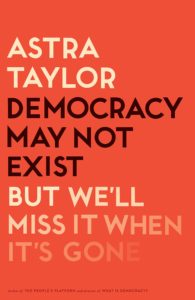Critics of democracy frequently rely on paradox to describe the political order that confers all power to the people. For Plato, democracy is the paradox of entrusting governance to an uncultivated, impecunious mob that lacks the knowledge and character needed to realize justice. For Jean-Jacques Rousseau, it is the paradox of trying to inculcate through political institutions the very egalitarian spirit that ought already to have presided over their establishment, or in other words, to make men through the laws into what they ought to have been before them. For W.E.B. Du Bois, it is the system that authorizes the poor and ignorant, who have neither the means nor the experience by which to govern, to teach themselves how to wield power intelligently. Do such paradoxes render democracy untenable? Astra Taylor, director of the film What Is Democracy? and author of Democracy May Not Exist, But We’ll Miss It When It’s Gone, thinks not. Paradox abides with democracy, Taylor claims, because it is the political order that aims to transmute natural human conflicts into cooperatively managed institutions that yield the broadest measure of justice for everyone. Self-contradictoriness is a feature, not a malady, of people power. This theoretical insight, which seems to have come from philosophical contemplation rather than ideological contestation, distinguishes Taylor from the growing chorus of concern trolls presently decrying democracy’s demise.
What Is Democracy? addresses Plato’s paradox from the jump. The film opens with a quotation frame from the Republic, the Socratic dialogue where Plato levels his strongest criticisms against democracy, then shifts to an extreme close-up of the horned tyrant from Ambrogio Lorenzetti’s mural, Allegory of Good and Bad Government, an unmistakable allusion to Plato’s thesis that democracy devolves inexorably into a tyranny of one. The tyrant’s jumbled eyes, suggestive of his deeper inner disorder, set a portentous tone for the opening conversation between Taylor and political theorist Silvia Federici, who, returning the tyrant’s gaze, remark on the many wrongs done in democracy’s name. Staging their conversation inside the sacrosanct, neoclassical halls of the Palazzo Pubblico in Siena, Italy, insulates the two interlocutors from the outward signs of liberal democracy’s recent tyrannical turn. The Old-World backdrop gives viewers the impression that a deep appreciation of historical patterns, rather than a banal moralism of the present, motivates their dialogue, an impression that continues into the film’s next scene, which shows a conversation, set at the ruins of Plato’s Academy, about the ancient democracy in Athens. One of the interlocutors there, Eleni Perdikouri, recounts Plato’s warning about the people’s romance with populist demagogues who rise to power by maligning economic elites, dropping the first of the film’s numerous hints that wealth inequality may be the source of Plato’s paradox. A quotation frame from Book IV of the Republic midway through the film affirms Perdikouri’s view: “For indeed any city, however small, is in fact divided into two, one the city of the poor, the other of the rich; these are at war with one another, and in either there are many smaller divisions.”
Rousseau’s democratic paradox makes a cameo in the film as well when Taylor meets political theorist Wendy Brown in the latter’s office at UC-Berkeley to discuss the pervasiveness of neoliberal economic thinking in contemporary life. Brown notes how neoliberalism’s total cooptation of liberal-democratic governments (such as what happened in Greece after the 2008 financial crisis, when the country’s capitalist creditors overruled a popular referendum rejecting austerity cuts to public programs) has created a world in which the only rational way to behave, on an individual or governmental level, is to defer to markets. Self-interest and inequity are widely accepted, even if widely maligned, features of neoliberal governance, a distinct yet comparable historical situation to the one that inspired Rousseau to write his Second Discourse, the essay in which he shows how inequality in the distribution of private property causes social division. The challenge for democrats, then, Rousseau argues in The Social Contract, is to make an egalitarian world out of people inculcated in a world of “mine and thine.” And yet, to found a true democracy, the people must to some extent already possess the egalitarian sense of justice that democratic institutions would produce and sustain. Out of the paradox of wealth inequality, then, arises the paradox of political education.
Working through the classical dilemmas of democratic theory through Socratic dialogue is only one of the film’s objectives. Another is to explore the less appreciated aspect of the Socratic method: the art of wandering the city and “delight[ing] in the procession of the inhabitants.” Taylor takes Socrates’ injunction to walk in the agoras and ports of Athens very seriously, stopping frequently in these places to speak with disaffected retirees, unemployed health clinic volunteers, and refugees from the wars in Syria and Afghanistan. Petitioning everyone for their views on democracy, freedom, and justice, Taylor amasses a collage of idiosyncratic perspectives for viewers to synthesize. Such labor is made the more difficult, and the more worthwhile, by the emotional intensity of certain moments in the film (such as when a young Syrian refugee, Salam Magames, recounts the day her mother was shot in Aleppo) that challenge one to face the difference between being moved to immediate empathy for human suffering and being moved to political insight about the background conditions of that suffering. Taylor’s audience will have to judge for themselves whether, after delighting Socratically “in the procession of the inhabitants,” such empathic delight actually leads to greater understanding of the causes of their movements.
Democracy May Not Exist, But We’ll Miss It When It’s Gone is a continuation of and a work apart from What Is Democracy? Once again, Plato’s Republic and the ancient Athenian democracy furnish the historical backdrop for a philosophical investigation of what democracy is. But if the film takes a deliberately contemplative stance toward its subject matter, leaving most of the work of synthesis to viewers, the book takes a step beyond contemplation toward a working democratic theory, offering eight “abiding paradoxes” (freedom/equality, coercion/choice, spontaneity/structure, etc.) that appear in every society that attempts to realize people power. Taylor intends this theoretical framework to stimulate rather than systematize our thinking about democracy, acknowledging that there may be variations of the eight paradoxes as well as additional ones she has not yet considered. The book spills considerable ink over how our “reliably conflictual” human natures reproduce the abiding paradoxes. “Conflict springs eternal,” Taylor writes, not only between people with unaligned individual interests, but also within the human psyche itself. Attempts to carry out democracy are thus attempts to sublimate natural human conflicts into cooperatively managed institutions that yield the broadest measure of justice for their constituents. According to Taylor, a flourishing democracy does not abolish conflict but raises it to a more intelligent plane. Comparing different democratic electoral models, for example, the author says: “No electoral model can single-handedly cure deeper social and economic divisions or ward off extremists, but more proportional representation would certainly improve matters, presenting different, and arguably more interesting, problems for citizens to contend with.” The goal of elections, or of any democratic institution for that matter, is to make society more adept at managing conflict. “What is democratic progress, after all,” Taylor asks rhetorically, “if not new and better problems?”
Taylor does a commendable job of compiling data from diverse fields to corroborate her central thesis that democracy is the sum of its abiding paradoxes. These data range from first-personal anecdotes about the failure of consensus in Zuccotti Park to dense academic reports on transnational financial institutions. The author navigates these different orders of discourse with perspicuity, making the book at once casually readable and intellectually engaging. For readers already familiar with its companion film, the book will seem repetitive in parts, as Taylor does not mind repackaging her best cinematic material as prose. That said, the book is not simply a prose redux of the film. On a general theoretical level, it adds texture to the concept of the democratic paradox, while its individual chapters reflect upon numerous democratic experiments, such as the Haudenosaunee Confederacy of North America, that are not covered in the film.
The book’s most noteworthy divergence from the film might be its insistence that wealth/poverty does not belong in the catalogue of democracy’s abiding paradoxes. “I see no reason,” Taylor writes in the introduction, “to accept the gulf between the haves and have-nots, the owning class and laboring class, as an inherently necessary paradox.” This seems to me to undermine one of the film’s signature insights, namely that democratic revolutions tend to foment in gilded societies with vast gulfs between rich and poor. As Taylor notes, in ancient Athens, Cleisthenes’ democratic reforms enfranchised the poor and soaked the rich, making the city-state “one of the first places [in recorded history] to include the impecunious as equals in the political power structure.” Yet democratic inclusion did not by itself assuage the tensions between the city’s impecunious and its well-to-do, a fact attested to by classic texts like Isocrates’ Antidosis, a fictional courtroom drama modeled after Plato’s Apology in which a rich Athenian man complains to a citizens’ jury that his poorer countrymen have been extorting him for public works subsidies. On trial for his life for refusing to finance a new commission, the old man recommends that democratic power be checked from above by educated elites. His argument reflects the tension, persistent throughout Athens’ history, between the city’s aristocratic and benighted classes.
Modern analogues of the same tension are easily found. W.E.B. Du Bois, in his history of the Reconstruction period in the United States, writes of democracy’s “eternal paradox” of class struggle:
If the ignorant and poor try to rule, their success in the nature of things must be halting and spasmodic, if not absolutely nil; and it must incur the criticism and raillery of the wise and well-to-do. On the other hand, if the poor, unlettered toilers are given no political power, and are kept by exploitation in poverty, they will remain submerged unless rescued by revolution; and a philosophy will prevail, teaching that the submergence of the mass is inevitable and is on the whole best, not only for them, but for the ruling classes.
Du Bois’ words suggest that radical democratic movements arise out of circumstances of severe political domination and economic want. The democratic ideal of the Reconstruction period following the U.S. Civil War took shape in dialectical opposition to the enormous inequities the black Freedmen confronted after Emancipation. The Freedmen’s efforts to overcome these inequities and institutionalize their progress proved that a true democracy of the people entailed justice for the poor and ignorant administered by the poor and ignorant. Contra Rousseau, then, Du Bois holds that the democratic social spirit emerges, not from institutions already achieved, but from the concrete struggles of the politically inexperienced to found institutions that truly involve and benefit them.
Taylor’s seeming change of heart regarding democracy’s “eternal paradox” of wealth and poverty stems from her learned wariness of neoliberal ideologues who insist that inequitable capitalist markets are the best that human cooperation can muster. Against these ideologues Taylor avers that capitalism, like other unjust political-economic systems, will pass out of history by popular demand. Although I appreciate Taylor’s caution about falling into neoliberalism’s ideological finger-traps, I find her more coherent when she stresses the conceptual link between democracy and popular economic struggle. “Extending democracy from the political to the economic sphere is the great challenge of our age,” she writes in the book’s introduction. Could the same not be meaningfully said of ancient Athens, of revolutionary France and Haiti, of the postbellum United States?
The book’s most valuable contribution to contemporary democratic theory may be its dialectical push beyond Plato’s paradox. Plato disavowed democracy because he did not think it could ever enlighten the ignorant. Taylor, citing real democratic movements past and present, shows that democracy can and does improve the intellectual lives of ordinary people when it takes the form of a coherent popular struggle against political and economic inequity. The night schools of the American socialist movement, the Freedom Schools of the Civil Rights era, the Highlander Research and Education Center in Tennessee, all began as alternative public-educational experiments to supplement larger democratic struggles. Strains of this same educational radicalism date back at least to ancient Athens, where, as the classicist Werner Jaeger notes, the establishment of democracy transformed the aristocratic ideal of paideia into a public one. The modern notion of communism, too, as envisioned by the young Karl Marx, aims at distributive justice in the public good of self-cultivation. For Marx, the point of overcoming political-economic inequality is to usher in a society in which all can freely experiment with and develop their full cognitive capacities. Taylor calls this “real communism” or “perfect democracy,” a human world in which aristocratic excellence does not require one group’s exploitation of another.
But perfect democracy, Taylor stresses throughout the book, has never existed and probably never will exist. Rather, it serves as the guiding ideal for the imperfect human societies that strive to implement universal justice. The first half of the book’s title, Democracy May Not Exist, encapsulates this persistent point. The title’s second half, But We’ll Miss It When It’s Gone, remains a puzzle for readers to work on. Does Taylor really think that the democratic ideal is on its way out of history? If so, why would she choose, as the closing words of her book, “Democracy may not exist and yet it still might”? Perhaps Taylor’s final, cryptic paradox is that democracy, like Heraclitus’ everliving fire, “kindles in measures and is quenched in measures.”
Kelly Swope lives in Nashville, Tennessee, where he works as a graduate student and teacher. He serves on the organizing committee of Vanderbilt Graduate Workers United and is currently writing a doctoral dissertation on G. W. F. Hegel’s philosophy of education. He hails from Granville, Ohio.
This post may contain affiliate links.








